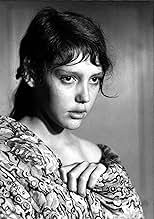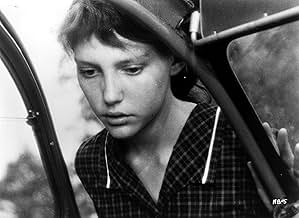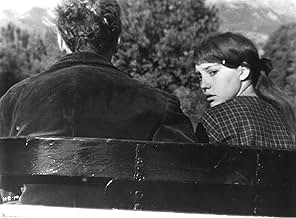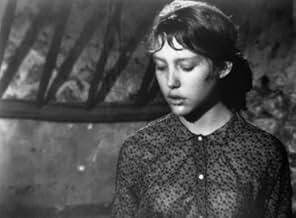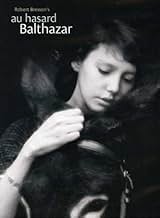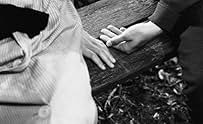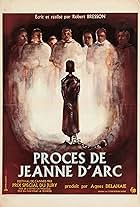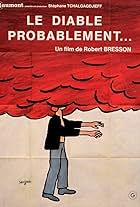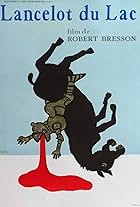IMDb-BEWERTUNG
7,7/10
24.028
IHRE BEWERTUNG
Die Geschichte eines misshandelten Esels und der Menschen um ihn herum. Eine Studie über Heiligkeit und ein Schwesterstück zu Bressons "Mouchette".Die Geschichte eines misshandelten Esels und der Menschen um ihn herum. Eine Studie über Heiligkeit und ein Schwesterstück zu Bressons "Mouchette".Die Geschichte eines misshandelten Esels und der Menschen um ihn herum. Eine Studie über Heiligkeit und ein Schwesterstück zu Bressons "Mouchette".
- Auszeichnungen
- 7 Gewinne & 2 Nominierungen insgesamt
Mylène Van der Mersch
- Nurse
- (as Mylène Weyergans)
Empfohlene Bewertungen
A truly unique work in cinema. It is simply amazing that a story that is, on the surface, mostly about the life of a donkey can cause you to ponder the mysteries and ironies of life and fate. Bresson created here a model of how to say more with less. The final scene of this film is illustrative of this in its extraordinary ability to deeply move the viewer with only a bare minimum of directorial touch.
The plot lines of Au Hasard Balthazar at times seem forced, sometimes confusing the viewer, and often leaving the characters' motivations unexplained. This matters little, however, because they all follow the same theme that one's actions, explainable or not, are often just a reaction to the environment within which we are placed. The human characters and the donkey are one. Just as Balthazar must succumb to the whims of his owners, so are we humans often just surviving, and submitting to, the actions of those who control us. The film is in many ways a rumination about the free will actually afforded us in life. A key scene is between Marie and the miserly farmer (winemaker?), where the latter expounds upon his philosophy. Money and self-confidence are the keys for him because they allow a certain autonomy that lets him do as he pleases. Money, or the lack thereof, is depicted in several instances as often replacing true morality or spirituality in the characters' lives.
Another scene that mesmerizes (there are several) is when Balthazar is pulling the circus-animal feeding cart through the cage area. The soundless shots of the donkey making eye contact with the other animals is brilliantly done (again with little camera flourish). They seem to be communicating silently with only their gazes, which say "here we are, this is our fate". Extremely affecting, and staggering in its simplicity.
This is a film to be watched again and then again, and then again. In one of the DVD extra features, film scholar Donald Ritchie states that he has seen Balthazar many times, yet he still cries during the ending. I believe this and understand it. Credos to Criterion for resurrecting this classic, and for again doing such a fine production job.
The plot lines of Au Hasard Balthazar at times seem forced, sometimes confusing the viewer, and often leaving the characters' motivations unexplained. This matters little, however, because they all follow the same theme that one's actions, explainable or not, are often just a reaction to the environment within which we are placed. The human characters and the donkey are one. Just as Balthazar must succumb to the whims of his owners, so are we humans often just surviving, and submitting to, the actions of those who control us. The film is in many ways a rumination about the free will actually afforded us in life. A key scene is between Marie and the miserly farmer (winemaker?), where the latter expounds upon his philosophy. Money and self-confidence are the keys for him because they allow a certain autonomy that lets him do as he pleases. Money, or the lack thereof, is depicted in several instances as often replacing true morality or spirituality in the characters' lives.
Another scene that mesmerizes (there are several) is when Balthazar is pulling the circus-animal feeding cart through the cage area. The soundless shots of the donkey making eye contact with the other animals is brilliantly done (again with little camera flourish). They seem to be communicating silently with only their gazes, which say "here we are, this is our fate". Extremely affecting, and staggering in its simplicity.
This is a film to be watched again and then again, and then again. In one of the DVD extra features, film scholar Donald Ritchie states that he has seen Balthazar many times, yet he still cries during the ending. I believe this and understand it. Credos to Criterion for resurrecting this classic, and for again doing such a fine production job.
Maybe I'm not as completely overwhelmed with the work of the immensely revered director Robert Bresson as others are, and I almost wish I was more so. I do know from the other films I have seen of his- Pickpocket and A Man Escaped- that he is one of the superior craftsmen of his time in France, a veritable storyteller with a very precise, original craftsmanship and way about telling his stories that shows compromise is nowhere in sight. However I don't think, try as I might (and I do love other films that do evoke religious connotations and metaphors like with Dreyer and Rossellini's films, which perhaps aren't as heavy-handed), to soak into all of the allegory of it all.
When it comes down to it, Au hasard Balthazar is a kind of fable, and it is successful even as some of the Christian connections are lost on me. It is strongest at being a dramatic look at two lives where drama doesn't need to be put to highest heights or given a shot of adrenaline. There's almost something very worn down about the characters- as well as the donkey Balthazar- that is the best part of what Bresson does try to draw parallels to. His direction might be un-easy to get along with, but it is rewarding in a cathartic way too.
Much has been written about Balthazar being a kind of saintly figure, or Jesus, who suffers all of his life and then at the end dies a sorrowful death for, perhaps, everyone else's sins. But if that side of reading into it isn't really suiting, and you're looking for just a really well-told story (which is really all a fable can do), the donkey's- and Marie's (Anne Wiazemesky) story does take on a neo-realist side to it too. It's the everyday things that count in this world, and act as burdens that don't give people the kind of life and enjoyment they could have.
While Bresson maybe doesn't have his great strengths in much of the dialog, his direction of the actors, which involved multiple takes to the point of (as with the donkey) beating the life out of it, is quite unique. Like with Pickpocket, you can tell something is so suppressed with them, even with the careless young man who Marie falls in love with- and later leaves- and the unfortunate drunk who 'takes care of Balthazar for a while, that it's no wonder nothing happy ever really comes to any of them. Also, the body language is so distinct and powerful that it really makes the uncomplicated nature of the photography and editing work that much more so. Turn the sound off and it might not even make a difference (what with lack of music)
Two of my favorite scenes might likely be two of the best scenes I've ever seen from the few Bresson films I've seen. One is when Balthazar has a brief stint in a circus, and it's interesting to see how the simplistic nature of the story reaches, for once, an almost ironically amusing point in this scene. For a moment you're pulled into that illusion of a Disney movie- where an animal is meant to be more like us, but then once reality comes back in it wipes that all away. The other scene is during a dance in a bar, where everyone's bopping away to a jazz song, and the young man mentioned before, throws bottles and causes a ruckus, but no one seems to stop dancing at all.
Are they too, who should be having a good time, that numbed by their lives to not be shook up by the disturbances around them? It is a film that really does get you thinking once it ends, about how small-town society treats things in very set ways that make some like Marie want to just get out. There's an undercurrent in the story of money being an integral- and hurtful- part of the world, where pride and suffering gets mixed up in it too. But most striking when watching the film are the scenes with the donkey, who punctuates the un-wavering methods of those around him (who very rarely are actually kind and happy around him, aside from the kids early on). These scenes display Bresson utilizing his storytelling and skills with poignancy that, if you can identify with the innocent(s) of the story, is kind of mind-blowing.
Even if the film is possibly imperfect, it nevertheless left me feeling I had seen something special. Few filmmakers can get away today with putting together a tragic story and pulling parallels between a worker animal and a misguided young woman and how others out there try to live every day. It's a brave movie more often than not that might hit (and has hit) other viewers both young and old alike. Grade: A
When it comes down to it, Au hasard Balthazar is a kind of fable, and it is successful even as some of the Christian connections are lost on me. It is strongest at being a dramatic look at two lives where drama doesn't need to be put to highest heights or given a shot of adrenaline. There's almost something very worn down about the characters- as well as the donkey Balthazar- that is the best part of what Bresson does try to draw parallels to. His direction might be un-easy to get along with, but it is rewarding in a cathartic way too.
Much has been written about Balthazar being a kind of saintly figure, or Jesus, who suffers all of his life and then at the end dies a sorrowful death for, perhaps, everyone else's sins. But if that side of reading into it isn't really suiting, and you're looking for just a really well-told story (which is really all a fable can do), the donkey's- and Marie's (Anne Wiazemesky) story does take on a neo-realist side to it too. It's the everyday things that count in this world, and act as burdens that don't give people the kind of life and enjoyment they could have.
While Bresson maybe doesn't have his great strengths in much of the dialog, his direction of the actors, which involved multiple takes to the point of (as with the donkey) beating the life out of it, is quite unique. Like with Pickpocket, you can tell something is so suppressed with them, even with the careless young man who Marie falls in love with- and later leaves- and the unfortunate drunk who 'takes care of Balthazar for a while, that it's no wonder nothing happy ever really comes to any of them. Also, the body language is so distinct and powerful that it really makes the uncomplicated nature of the photography and editing work that much more so. Turn the sound off and it might not even make a difference (what with lack of music)
Two of my favorite scenes might likely be two of the best scenes I've ever seen from the few Bresson films I've seen. One is when Balthazar has a brief stint in a circus, and it's interesting to see how the simplistic nature of the story reaches, for once, an almost ironically amusing point in this scene. For a moment you're pulled into that illusion of a Disney movie- where an animal is meant to be more like us, but then once reality comes back in it wipes that all away. The other scene is during a dance in a bar, where everyone's bopping away to a jazz song, and the young man mentioned before, throws bottles and causes a ruckus, but no one seems to stop dancing at all.
Are they too, who should be having a good time, that numbed by their lives to not be shook up by the disturbances around them? It is a film that really does get you thinking once it ends, about how small-town society treats things in very set ways that make some like Marie want to just get out. There's an undercurrent in the story of money being an integral- and hurtful- part of the world, where pride and suffering gets mixed up in it too. But most striking when watching the film are the scenes with the donkey, who punctuates the un-wavering methods of those around him (who very rarely are actually kind and happy around him, aside from the kids early on). These scenes display Bresson utilizing his storytelling and skills with poignancy that, if you can identify with the innocent(s) of the story, is kind of mind-blowing.
Even if the film is possibly imperfect, it nevertheless left me feeling I had seen something special. Few filmmakers can get away today with putting together a tragic story and pulling parallels between a worker animal and a misguided young woman and how others out there try to live every day. It's a brave movie more often than not that might hit (and has hit) other viewers both young and old alike. Grade: A
Born into a world of despair, pain and fear, with a back to carry allsorts on and two eyes to fill with tears, abused and often put upon, never knowing where things might have gone, but conforming to the stick and whip, while no one hears your prayers.
Poor old Balthazar doesn't know which way to turn, on occasions folks are kind and free, at other times they let him burn, but why are they so changeable, what makes these people tick, is it natural that their spirit is to hurt, with pain inflict.
The hazards of being a young woman growing up in rural France and the challenges of a donkey with the same backdrop, both brilliantly performed by the donkey and Anne Wiazemsky, who leave you under no illusion of the suffering they have to endure.
Poor old Balthazar doesn't know which way to turn, on occasions folks are kind and free, at other times they let him burn, but why are they so changeable, what makes these people tick, is it natural that their spirit is to hurt, with pain inflict.
The hazards of being a young woman growing up in rural France and the challenges of a donkey with the same backdrop, both brilliantly performed by the donkey and Anne Wiazemsky, who leave you under no illusion of the suffering they have to endure.
It took me years to track down a video copy of this rare film. It was definitely worth searching for. It's my favorite of Bresson's films. A very intense and dark drama about the quality of human and animal life on the face of the earth. This film will definitely bring you to your knees.
The film's ending is one of the most memorable in cinema, and achieves an eerie grace, consistent with its almost unique tone - allusively Biblical and allegorical, yet resistant to specific meanings and interpretations. The plot is a narrative of human cruelty and escalating despair, but always with enough mystery in the motivation to ward off easy condemnations; and perhaps even to indicate divine guidance. Throughout, Wiazemsky seizes on the donkey as a symbol of transcendence(her mother calls it a saint in the end); it's formally christened at the beginning and undergoes something approaching a formal funeral, all of which gives its life the contours of a spiritual journey of discovery. The narrative encompasses both revelations (the interlude in the fair; new tortures like the mean old man who starves and beats him) and retrenchment; both life's austerity, its roots in servitude, and its enormous potential dignity. Never was a donkey filmed so evocatively - but as always with Bresson, the simplicity is thrilling too - there's no false artistry here; no dubious anthropomorphism. A necessary film, and I'm amazed that I'm the first one to be commenting on it here.
WUSSTEST DU SCHON:
- WissenswertesBalthazar was an untrained donkey during most of the filming, which made Robert Bresson's work a real challenge. The only scene for which the donkey was trained was the circus math trick.
- PatzerIn the very last shot of the film the shadow of the camera man or someone else enters the picture from the bottom right.
- Zitate
Gerard: Lend him to us.
Marie's mother: He's worked enough. He's old. He's all I have.
Gerard: Just for a day.
Marie's mother: Besides, he's a saint.
- Alternative VersionenRestored in 2014 from the original 35mm negative by the Éclair Group and L.E. Diapason.
- VerbindungenEdited into Geschichte(n) des Kinos: Seul le cinéma (1994)
- SoundtracksPiano Sonata No.20 in A Major, II. Andantino (D. 959)
Music by Franz Schubert
Performed by Jean-Joël Barbier
Top-Auswahl
Melde dich zum Bewerten an und greife auf die Watchlist für personalisierte Empfehlungen zu.
- How long is Au hasard Balthazar?Powered by Alexa
Details
Box Office
- Bruttoertrag in den USA und Kanada
- 45.406 $
- Eröffnungswochenende in den USA und in Kanada
- 8.436 $
- 19. Okt. 2003
- Weltweiter Bruttoertrag
- 45.406 $
- Laufzeit1 Stunde 35 Minuten
- Farbe
- Sound-Mix
- Seitenverhältnis
- 1.66 : 1
Zu dieser Seite beitragen
Bearbeitung vorschlagen oder fehlenden Inhalt hinzufügen



